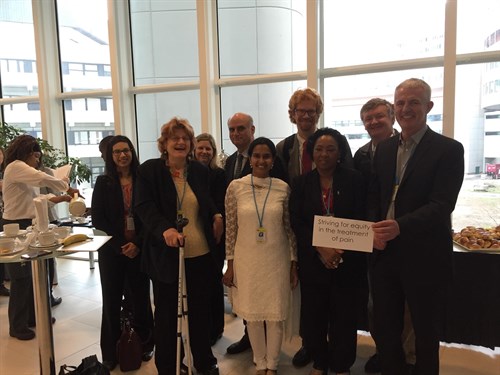Side event at 59th Session of the Commission on Narcotic Drugs, Vienna, March 2016
‘Striving for equity in the treatment of severe pain.’
3 Apr 2016We live in a world where the richest 20% of the population consume almost all the available morphine while the poorest 80% are left to suffer in agony.
‘I hate to imagine what cancer pain is like, I have not experienced it,’ says Dr Zipporah Ali, Executive Director of Kenya Hospices and Palliative Care Association. ‘However, I have witnessed cancer patients who have no access to appropriate pain medication. We are living in a time where we talk about best standards of care, of human rights, equal opportunities. Let us join our efforts to ensure opioids are available to relive pain not just in the developed world, but globally. Pain relief is a human right.’

The side-session focused on one area – that of the inequality of availability of analgesia, especially morphine and how the international drug control system to prevent the misuse of drugs like heroin appears to have contributed strongly in preventing access to opioid analgesics and creating an unnecessary atmosphere of fear when it comes to the prescribing/dispensing of these drugs for the treatment of pain. This in spite of the fact that member states are obliged to ensure controlled medicines are made available and any restriction of access constitutes a violation of the right to health.
This has contributed to a situation where 80% of the world’s population, has very little or no access to opioid analgesics, particularly morphine for the treatment of pain. This leaves huge numbers of people suffering intolerable pain whether dying of cancer, with end-stage AIDS and other terminal illnesses, accidents with acute pain, women in labour and having complications in childbirth, wounded victims of war torn areas or many other situations that bring about severe pain. Doctors are being prevented from being able to do their job by this lack of access to essential, evidence-based and effective medicines.
The session had 2 main presentations:

Clinical Consultant and Project Coordinator,
Trivandrum Institute of Palliative Sciences

Executive Director, Kenya Hospices and Palliative Care Association
You will see from the “Outcomes document from CND” that access to controlled medications has been mentioned for the first time so it will be almost certainly discussed at UNGASS.
Click here to read the full pdf
Doctors can lead the way to healthier drug policies – join IDHDP now
Share this on: